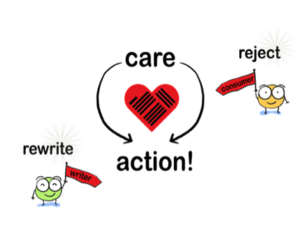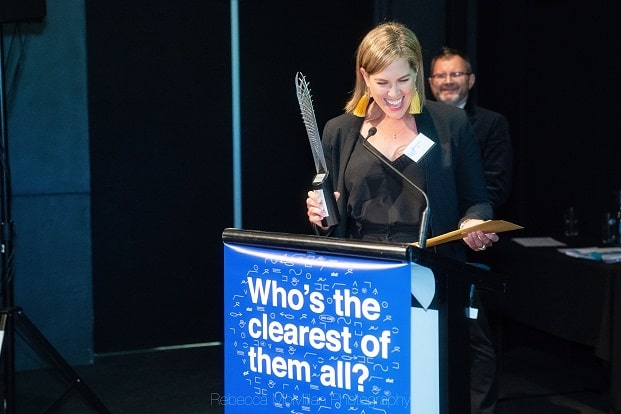
Don’t panic! You’ve got extra time to get your Plain English Awards entries in | Photo by Lukas Blazek on Unsplash
We know what it’s like to be busy, and how difficult it can be to meet deadlines when the pressure’s on. That’s why we’re giving you extra time to submit your Plain Language Awards entries.
Entries for the 2022 Plain Language Awards will now close at 5pm on Tuesday, 2 August.
Get the recognition you deserve for your clear communications
The Plain Language Awards are one of New Zealand’s leading industry awards. Imagine how good you and your team would feel if you became a finalist … or even a winner?!
Find out more about our Awards categories
Get some inspiration from our past winners
Nominate the good and the bad for People’s Choice
Dob in a bad document, or praise an easy-to-read one! The more the public speak up and demand plain English, the easier it is for us all.
Power to the people — vote for plain!
Have you read something that strained your brain? Nominate it!
Get involved with the People’s Choice
It only takes a sentence!
If you’re short on time, enter a few beautifully transformed sentences for the Best Plain Language Sentence Transformation award.
Well-written sentences create a fine reading experience
Enter your transformed sentences by 2 August
Nicola Welby July 29th, 2021
Posted In: 2022 Plain Language Awards, Best Plain Language Sentence Transformation, Communications, Industry awards, People's Choice awards, Social good
Tags: Best Plain English Communication, clear communication, clear writing, Industry awards, People's Choice, Plain English Awards

Well done to our patron, Chloe, who was recognised as an Officer of the New Zealand Order of Merit in the 2021 New Year Honours List.
We couldn’t be more proud of our generous patron, Chloe Wright. In recognition of her enormous commitment to philanthropy, education, and health, Chloe was awarded an Officer of the New Zealand Order of Merit at the start of 2021.
An exemplar of kindness and care
In 1996, Chloe and her husband Wayne co-founded BestStart Educare, an early learning education organisation. BestStart is now New Zealand’s largest early learning organisation and is run under the Wright Family Foundation. This foundation provides funds and assistance to improve the educational, emotional, and psychological wellbeing of New Zealanders.
As well as carrying out her philanthropic work through the Wright Family Foundation, Chloe founded Birthing Centre in 2014, which now has four locations. Birthing Centre is a service offering extensive postnatal support to new mothers and their babies. Its vision is to work in partnership with families to effect an informed, active, and natural birthing experience.
Chloe is also patron of SuperGrans Aotearoa, Kids’ Lit Quiz, the New Zealand Spelling Bee … and of course the Plain Language Awards!
Chloe believes passionately in the goals of the Awards. She wants to see plain language as the norm in government and business communication — so that information is clear and easy to access for everyone.
Chloe’s enthusiasm for, and dedication to, all the causes she supports is truly remarkable. Congratulations, Chloe! We’re so grateful for her support as Awards patron.
Meet our Awards patron
Interested in sponsoring?
If you’re interested in supporting the Plain Language Awards, please get in touch. We’d love to hear from you, and we’d love to work with you.
Please contact Hellie to find out about sponsor benefits at enquiries@plainlanguageawards.org.nz
Become a sponsor
Melissa Wardell March 23rd, 2021
Posted In: 2021 Plain English Awards, Social good, Sponsors, Sponsorship
Tags: clarity, patron, sponsors, Sponsorship, Wright Family Foundation

A big driver of the Plain English Awards is to improve the quality of communications created for everyday New Zealanders.
We want you, as a member of the New Zealand public, to be able to understand everything that’s communicated to you. Because it’s your right to understand!
Another organisation pushing for clear communications is WriteMark. The WriteMark is a quality mark awarded to documents or websites that achieve a high standard of plain language.
When your document holds the WriteMark, your readers can be sure that your writing meets a very high standard of clarity. The WriteMark is an internationally recognised quality mark developed in New Zealand.

We’re very proud to have WriteMark as one of our principal sponsors
Find out more about WriteMark
Nicola Welby August 7th, 2019
Posted In: 2019 People's Choice Awards, Social good, Sponsors
Tags: WriteMark

Is your writing like a can of worms? Image by Sam Howzit, Creative Commons 2.0 licence.
You’re in for a plain English treat over the next couple of years. This year we’re pushing the People’s Choice Awards to the fore (we’ll be back with the full Awards next year). So right now, in 2019, we’re giving all of you in the public domain the chance to nominate your most and least favourite communications.
Here are three great reasons to get involved this year.
You want to do something about frustratingly confusing communications
When you nominate a communication for the not-so-coveted Brainstrain award, you’ll be helping to make a positive difference to the way organisations communicate. Almost without exception, organisations step up to ‘take it on the chin’ when nominated for the dreaded bin of sour worm lollies. With the public scrutiny they get from winning the Brainstrain category, they’re motivated to change.
You want to share a wonderful example of clear communication with the world
We love to celebrate the great work happening in so many organisations that are improving the way they communicate. Winning the award for Best Plain English Communication is a public pat on the back for New Zealand’s clearest communicators. Help them get the recognition they deserve.
You want to help improve the lives of everyday Kiwis
The People’s Choice Awards help organisations to keep things real with their communications. If they win the Best Plain English Communication award, they’re recognised for getting things right for their audience. If, however, they win the dreaded Brainstrain award, they have plenty of incentive to change for the good.
Don’t muck about. It’s time to send your nominations for this year’s People’s Choice Awards!
Nicola Welby May 27th, 2019
Posted In: 2019 People's Choice Awards, Industry awards, People, Social good
Tags: Brainstrain, clear thinking, jargon, jargon-busting, People's Choice
Read on for part 2 of the inspiring speech given by Lynda Harris, Awards founder and CE of main sponsor Write Limited, at the 2018 Plain English Awards
I said that care can be a powerful catalyst for action if we will act on what we feel prompted to do. The three law firm owners I interviewed had done just that — they literally turned their values and sense of care into strong action.
So, believing what you do about the power of plain language, my question to you as both writer and consumer is ‘what action can you take that is bigger and bolder than before?’ How can you make your sense of care count?
As a writer your awareness of the benefits of plain language will naturally spur you on to rewrite. Make your effort meaningful! What significant project needs your support and insights? Which of your reader groups are most in need? Who must you persuade? Where can you make a difference?
As a consumer, it’s your voice that will bring change, so speak up! When you receive a document that is anything but reader-friendly, reject! Don‘t sign a difficult to understand contract. Query unclear instructions and ask for better. Tell companies what you think of their convoluted policies.
Let care equal action. Let care equal clear.

Find out more about the WriteMark Plain Language Standard
Melissa Wardell February 14th, 2019
Posted In: 2018 Plain English Awards, Industry awards, Social good
Tags: 2018 Plain English Awards, Care, clear communication, Social good

Taking care costs nothing and means everything. Image by Ross Findon. Unsplash licence
Read on for part 1 of the inspiring speech given by Lynda Harris, Awards founder and CE of main sponsor Write Limited, at the 2018 Plain English Awards
Good evening! Let me start with a question: Why are you here? What prompted you to enter the annual Plain English Awards? What brought you along tonight?
I’m pretty sure that you’re here because you care. You care about the cause. You care about the ideal of plain language because you understand the cost, in both financial and human terms, of poorly conceived and written communications. You care about wasted effort, wasted time, and wasted money.
And you care about the enormous disadvantage that poor writing can bring, especially when the communications are about access to justice, or help of some kind, or are connected with legal, financial, or health services.
It was the very same notion of care that prompted us, 13 years ago, to set up these Awards.
It was because they cared that our foundation sponsors, Consumer, TechCommNZ, and Graphic Solutions came on board, as did our other wonderful sponsors who followed.
And it was also that notion of care that led us to establish the WriteMark Plain Language Standard, now cleverly rebranded by Craig Christensen to reflect that central idea of — you got it — care.

The thought I’d like to leave you with tonight is that, rather than thinking of care as simply an emotion connected with plain language, let’s recognise that care has tremendous value in its own right. Care can be a powerful catalyst for action if we follow through on what we feel prompted to do.
I came to this conclusion after preparing for a presentation at Clarity2018 in Montreal recently. The conference was attended by over 500 delegates from around the world, most of them lawyers. In my presentation I explored the idea that having a set of strong, people-based values baked into the firm’s mission might lead naturally to clearer, more accessible law.
I interviewed several B Corp law firms in Australia and Canada. B Corps are accredited organisations that believe business can be a force for good in the world.
What struck me was that in each conversation the people I interviewed used the word care — a lot. They also used another word: ‘believe’. As they spoke about what they believed in, their values, and precisely what they care about, became clear.
Here’s what three of those firms said.
Alexandra Doig from Atticus values care in communication
I loved my interview with Alexandra Doig, Managing Partner of Atticus Lawyers in Melbourne, Australia. With strong convictions about human rights, Alexandra chose to get B Corp accreditation several years ago. Her core philosophy, ‘We believe in treating people as they would want to be treated’, shone through our entire conversation.
It’s not often you hear a lawyer say, ‘We want everyone to feel comfortable all of the time. We know clients are already stressed with the issue. We aim to reduce that stress and make them feel happier … create a safe space … feel that we are their cheerleaders.’
I asked Alexandra the all-important question: Does your chief value of ‘care’ influence the way you write to your clients? The answer: ‘Yes. Telling people what they need to know, and doing all we can to help, means we need to write like a human. We need to communicate clearly and personally in ways that don’t alienate. We can’t give a client a convoluted document. We have to walk the talk and act on what we believe in.
‘We could write a ten-page document. We try to write a one-pager that clearly captures the most important info, and that the client can easily understand and be comfortable with. It’s a calculated risk — with benefits.
‘We want to write in a way that gives clients that lightbulb moment. If a client doesn’t walk away with a greater understanding of their position than they had when they arrived, we haven’t done our job properly.’
Bravo, Alexandra!
Joel Cranshaw from Clearpoint. believes in simple legal services
Joel’s strapline on his website says it all: ‘Legal services — reimagined simply.’ With a background as an experienced corporate lawyer, Joel said he’d always loved solving client problems. But as time went on, he felt less and less comfortable in a system based on chargeable units. ‘I felt there was no incentive to be efficient, and this often led to friction between client and lawyer.’
Prompted by strong values that focused on serving the client in the best way possible, Joel conceived Clearpoint’s unusual model, where they work on retainer for small to medium-sized firms in Melbourne and beyond. Achieving B Corp status was a natural fit.
Joel is a straight talker: ‘We want to work with compassionate people who value what we do and whose approach aligns with the concept of conscious capitalism. We don’t work with clients who don’t have our values.’
When asked if his values-based approach created clearer law, Joel’s answer was unequivocal: ‘Yes! I say that for two reasons. Our retainer-based fee model means that we must work efficiently — so we must be clear, concise, and to the point. And what we believe in, our philosophical approach to compassionately meeting clients’ needs, also means that we must communicate in ways they can readily understand.’
Applause once more from me!
Sophie Tremblay from Novalex runs a purpose-driven business
Sophie’s was a bold start-up story — similar to the Suspended Coffee movement (buy a coffee, pay for two — those who can’t afford to pay get coffee for free). Sophie and her business partner Ryan Hillier set up Novalex to have a self-sufficient business model, serving both corporate clients and others who need legal help. Neither an exclusively for-profit business, nor an exclusively philanthropic organisation, Novalex is a purpose-driven enterprise doing business for good. For every fee-paying hour, they give a pro-bono hour to eligible start-ups, non-profits, or individuals.
In Sophie’s words, ‘We believe everyone should have access to justice and top-notch legal advice. We hope that corporate clients will see using Novalex as a socially responsible choice. And we hope to give back in any way we can.’
Does this values-based model create clearer law? Sophie: ‘Absolutely! We know that even the smartest people aren’t necessarily familiar with legal terms and concepts. So a huge part of what we do is to make the law understandable. We use concrete examples and remove the abstract, along with many other techniques such as metaphor (“It’s like…”), and “This means…” We remove jargon and make important concepts stand out. We do what we need to do to be understood.’
Care intuitively leads to plain language
Hearing this long list of useful and well-founded plain language techniques, I asked Sophie if she had ever had any formal plain language training. She hadn’t. Nor had Alexandra or Joel. Yet instinctively, motivated by strong human values and a sense of care, all three ticked so many plain language boxes.
My hypothesis was looking good — all three firms proving that care really can be a shortcut to plain language. Admittedly my sample size was only three, but these inspiring leaders and others like them are truly showing the way to clearer law using an approach based on care.
Find out more about each of the three firms here:
Atticus
Clearpoint.
Novalex
Find out more about the WriteMark Plain Language Standard
Melissa Wardell February 12th, 2019
Posted In: 2018 Plain English Awards, Communications, Social good, Sponsors
Tags: 2018 Plain English Awards, Care, plain language, Social good

'We worked for 3 years to get this!' Winner of the Best Plain English Document — Private sector Jacqueline Taylor celebrates her success. Photo by Rebecca McMillan Photography.
What an amazing ceremony last night! Congratulations to all our 2018 winners — you deserved all the recognition you got. The feedback you each received from your judges truly shows that plain English is alive and kicking in New Zealand. It also shows that, as a Trust, we’re making great strides towards fulfilling our goals.
‘Keep going and spread the word!’
A special mention to the winners of our Plain English Champion — Best Individual or Team category. The work that’s gone into the Better Letters Project at the Ministry of Social Development is seriously changing the lives of everyday New Zealanders.
Our judges got it right when they said, ‘Keep going and spread the word! Imagine what New Zealand’s public service might look like if every government department took this approach!’
Find out about this year’s winners
Take a look at photographer Rebecca McMillan’s wonderful photos of the ceremony
Melissa Wardell November 16th, 2018
Posted In: 2018 awards ceremony, 2018 winners, Finalists, Social good, Winners
Tags: 2018 Plain English Awards, 2018 Winners, Champion, clear communication, People's Choice

Learn tips from the experts on how to win. Photo by Ray Hennessy on Unsplash
On Friday, 4 May we’ll be celebrating entries opening for this year’s Awards with a free lunchtime seminar at Write Limited in Wellington.
Hear how to be a winner from the experts
We’ve gathered together a panel of experts to give you tips on how to submit a winning entry. You’ll get expert advice from past winners, judges, and supporters of the Awards, upping your chances of a successful entry.
During the seminar our panel will explain:
- what judges look for in a winning entry
- what’s involved in submitting an entry
- what winning an Award means for an individual or organisation
- why every entry plays an important part in helping everyday New Zealanders.
Book your tickets now
You’ll have plenty of time to ask questions. Bring your own lunch — we’ll supply coffee, tea, juice, and fruit.
Places are limited so book your tickets now. Entry by koha.
Melissa Wardell April 11th, 2018
Posted In: 2018 Plain English Awards, Plain English Awards, Social good, Trophy Tips Seminar
Tags: 2018 Plain English Awards, Plain English Awards, Trophy Tips Seminar, Turnaround Award

Everyone wins with a sound sponsorship agreement. Photo by Shirly Niv Marton / Unsplash
Sponsorship isn’t about giving away money to a good cause: that’s donating. Sponsorship offers two parties the opportunity to be part of a win–win agreement.
In return for their support, sponsors get the same feel-good factor they would get from donating. But on top of that, they also get a return on the investment in their chosen cause. So, true sponsorship offers an organisation something sustainable and tangible in return for its commitment.
Sponsors get clear returns on their investment
Sponsoring the Plain English Awards offers clear returns on your investment, such as:
- alignment with plain English values. You’re seen as customer-focused, transparent, and trustworthy
- brand exposure. Forget about advertising! You’ll be widely promoted in our Awards publicity, reaching large groups of potential new customers
- networking opportunities. Plain English Awards entries come from a huge range of public and private organisations. The networking opportunities you get from Awards forums (in person and online) offer a hugely valuable return, as does the actual presentation ceremony.
Is your organisation a sponsorship ‘best match’?
Looking at the values and aims of the Plain English Awards, and from our past experience, we know the types of organisations that benefit most from sponsorship.
If you can answer ‘Yes’ to any of these questions, sponsoring the Plain English Awards could be just the thing for you:
- Do you want to reinforce to your clients or customers that you always work with their best interests in mind?
- Do you want to reinforce to your clients or customers that you are transparent in your dealings with them and with other organisations?
- Do you want to be part of a movement to improve government and business documents so that all New Zealanders can understand them?
- Do you want to help build a public preference for plain English?
- Do you love celebrating success?
Answered ‘Yes’ to one of more of these questions? It’s time for a conversation!
We’d love to hear from you
Get in touch if you’d like to talk through sponsorship opportunities at this year’s Awards. We’d love to discuss a sponsorship arrangement that would benefit both the Awards and your organisation.
Phone: +64 4 384 6447
Email: enquiries@plainlanguageawards.org.nz
Visit our website for more information about the 2018 Plain English Awards
Melissa Wardell March 13th, 2018
Posted In: 2018 Plain English Awards, Plain English Awards, Social good, Sponsors
Tags: 2018 Plain English Awards, Plain English Awards, Social good, Sponsorship












